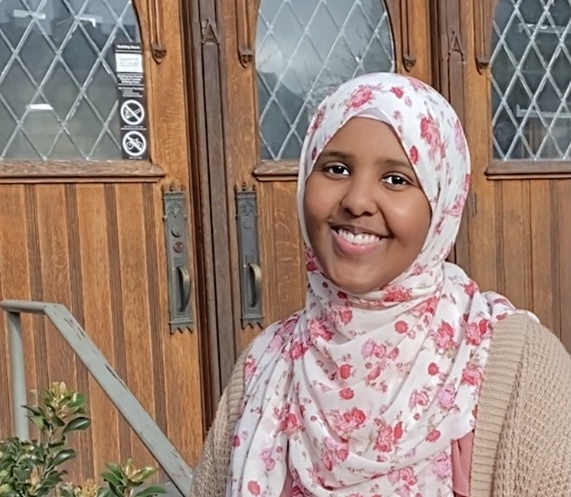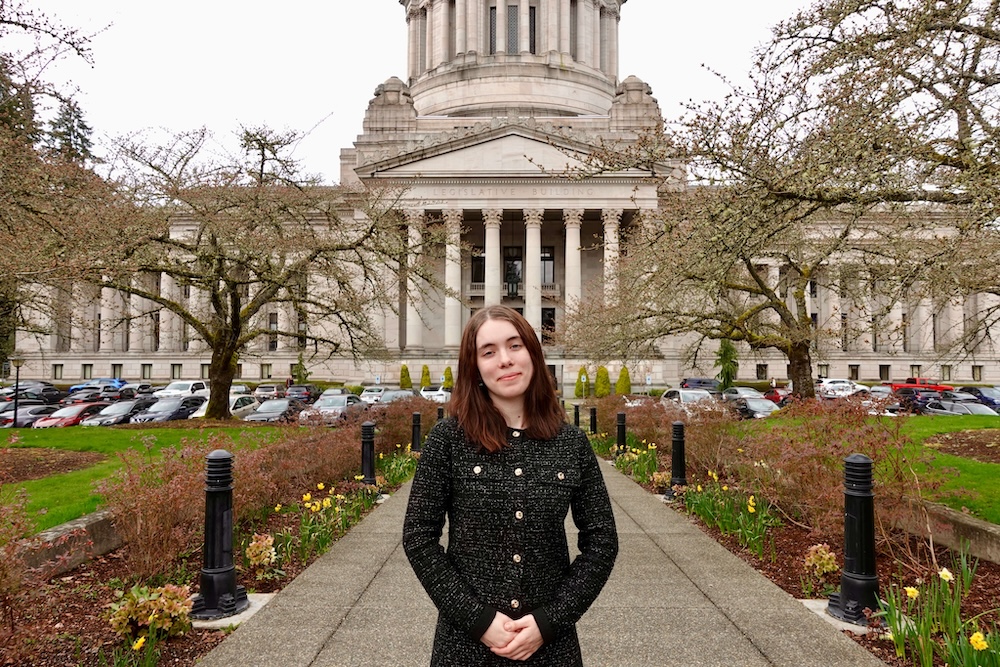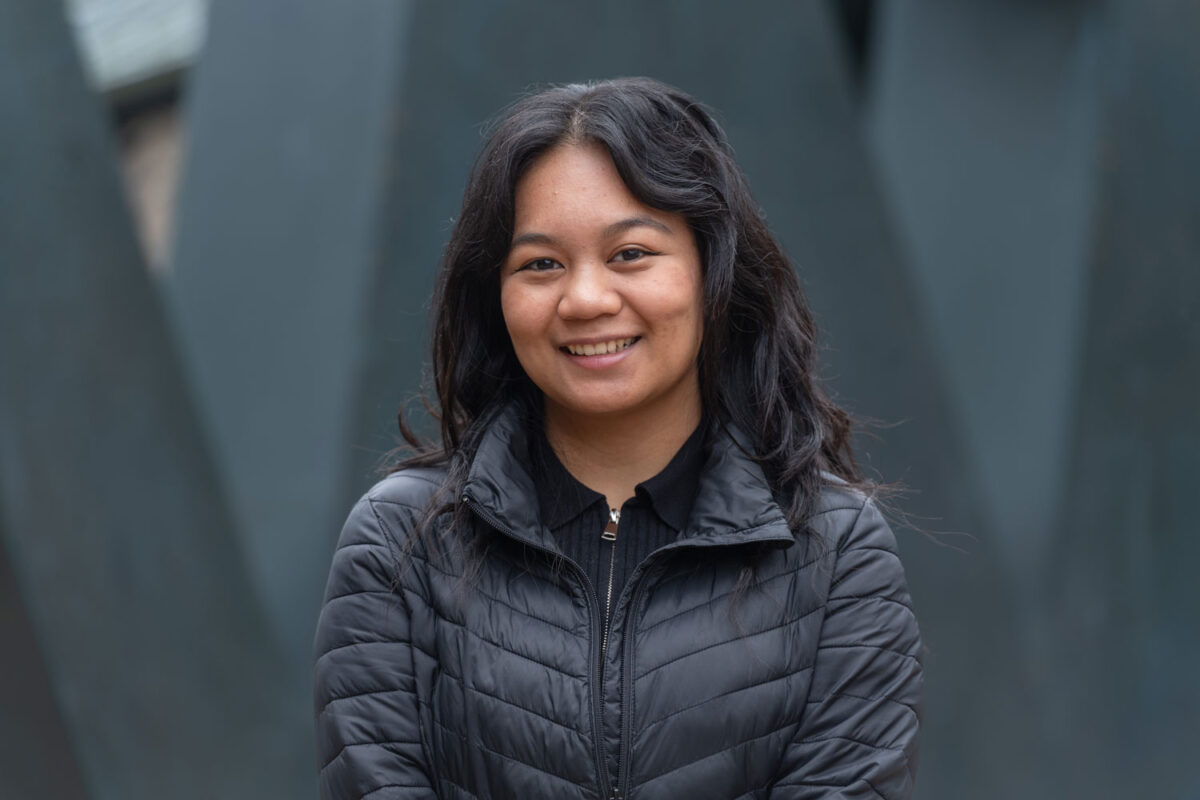“No matter how hard you work or how much recognition you gain, as long as there’s an ounce of doubt within you, it will spoil everything else.”
These words of wisdom from her mother propelled Nasra Mohamed, a Somali immigrant and first-generation college student, from a point of extreme doubt to a position of confidence and clarity.

Transferring to the University of Washington Bothell from Highline College in 2020 at the height of the coronavirus pandemic, she initially felt out of place and struggled to find a sense of community. But at the end of her first quarter, she accepted an invitation to join Tau Sigma, the national honors society for transfer students, and she discovered her unique perspectives were not only valued but celebrated.
Mohamed went on to seek community elsewhere on campus with students who shared her background. She joined the Black Student Union and Somali Student Association, which then led her to a position as a research assistant on a UW Population Health Initiative project with the Somali Health Board.
A spring 2022 graduate with a degree in Environmental Studies from the School of Interdisciplinary Arts & Sciences, Mohamed was named one of the 2022 Husky 100 honorees for her expansive contributions to UW Bothell and to her community.
Each year, the UW recognizes 100 undergraduate and graduate students from Bothell, Seattle and Tacoma campuses who make the most of their time at the University. The recipients actively connect what happens inside and outside of the classroom, applying what they learn to make a difference on campus and in their communities. Mohamed is one of 11 students from UW Bothell to be recognized for 2022.
Helping others find community
Joining BSU and SSA added to Mohamed’s sense of place and welcome. “Being able to share laughter and have a dialogue about belonging with students who understood what it was like to feel like an outsider was a relief,” she said.
She learned the importance of “lifting one another up” and soon took leadership roles with both organizations. As BSU community outreach chair, she organized virtual events to engage members and other UW Bothell students, hosted speakers from different industries to share their professional journeys and took part in discussions on how to improve the student experience. As SSA community outreach officer, she connected club members with volunteer opportunities in the community and created events specific to local Somali people.
Both roles engendered a passion for community outreach and advocacy. In February 2021, Mohamed became involved with UW Mutual Aid, an organization that provides emergency financial support for students. She managed the accounts, assisted with social media posts and helped with grant applications.
Yet all this good work in the community left her with a nagging question: How could she fulfill her lifelong wish to become a physician while practicing her passion for community advocacy?
She found the answer in her classrooms.
Personal experience for the public good
Working closely with her professors, Mohamed realized that they were not only educators but also researchers incorporating their external interests into the curriculum.
“They taught me the importance of analyzing different viewpoints and understanding how they can all contribute to a single outcome,” Mohamed said, noting that this helped her realize that she could merge her community advocacy experiences with her goal of working in health care.
She became a research assistant on a UW Population Health Initiative study with the UW’s Department of Global Health and the Somali Health Board. She had previously volunteered with the health board and was enthusiastic about supporting the health of her own community. The work focused on exploring barriers to COVID-19 testing within the King County Somali community. She knew firsthand how language barriers impact the health and well-being of families and communities with limited political power.
“I was able to create meaningful data narratives and findings that confirmed my lived experiences and that of my family and my community,” she said. “There existed a widespread distrust of health care providers compounded by persistent health literacy barriers, which contributed to negative health outcomes.”
Her contributions to the work were profound, noted Dr. Keshet Ronen, assistant professor in the Department of Global Health, in her Husky 100 nomination of Mohamed.
“Nasra has been an enormous asset on our study team. She is extremely committed to her work and has been critical to several aspects of study implementation. She supported community-based quantitative and qualitative data collection for the study, led translation and transcription of interview recordings from Somali into English, has been an active participant in quantitative and qualitative data analysis, and has given community presentations on the study.”
Passion meets profession
In July 2021, Mohamed deepened her public health experience with the same team on a project to reduce maternal mortality in the Puntland State of Somalia. It focused on a female health workers program led by the Somalia Ministry of Health. Mohamed collected quantitative data on maternal and child health indicators, designed interview guides for front-line health care workers and conducted literature reviews.
“The project also looked at strengthening the coordination of local public health systems,” Mohamed said. “As a future physician and researcher, I plan to use this experience to promote health equity among refugee and immigrant communities in King County.”
Dr. Sara Maxwell, associate professor in UW Bothell’s School of IAS, also supported Mohamed’s Husky 100 nomination.
“She has applied both her experiential and academic knowledge through her work with the Somali Health Board and the Population Health Initiative at UW by doing community-based work to magnify marginalized people’s experiences with the health sector and move toward real solutions.
“Nasra brought this kind of ‘whole self’ experience into the classroom as well, and I continue to learn from her — knowing she will continue to make incredible impacts on world as a health professional and community advocate.”
Sharing lessons learned
Echoing her mother’s words of wisdom, Mohamed has her own advice for her future self that she hopes can apply to all college students:
Dear Future Self,
I’d like to say every space will feel like a community and every classroom will feel welcoming, but that may not always be the case. Remember to keep your head up and acknowledge the journey you have been on that led you to where you are.
Continue to work through imposter syndrome. It isn’t an obstacle that you can overcome in a single day. It requires ample amounts of self-acceptance and self-growth.
Please don’t ever wait until it is unbearable to reach out for help. We both know how painful it was the first time around.
Knowing how important community advocacy is, continue to seek opportunities that allow you to grow and apply the skills you’ve gained. Understand that your pursuit of medicine and community advocacy intersect, so don’t ever feel like you have to pick one or the other.
I hope you use your experiences from both in and out of the classroom as a first-generation Somali immigrant to help students who may be going through something similar and to look back on your UW journey, as unconventional it might have been, as one to be proud of.



